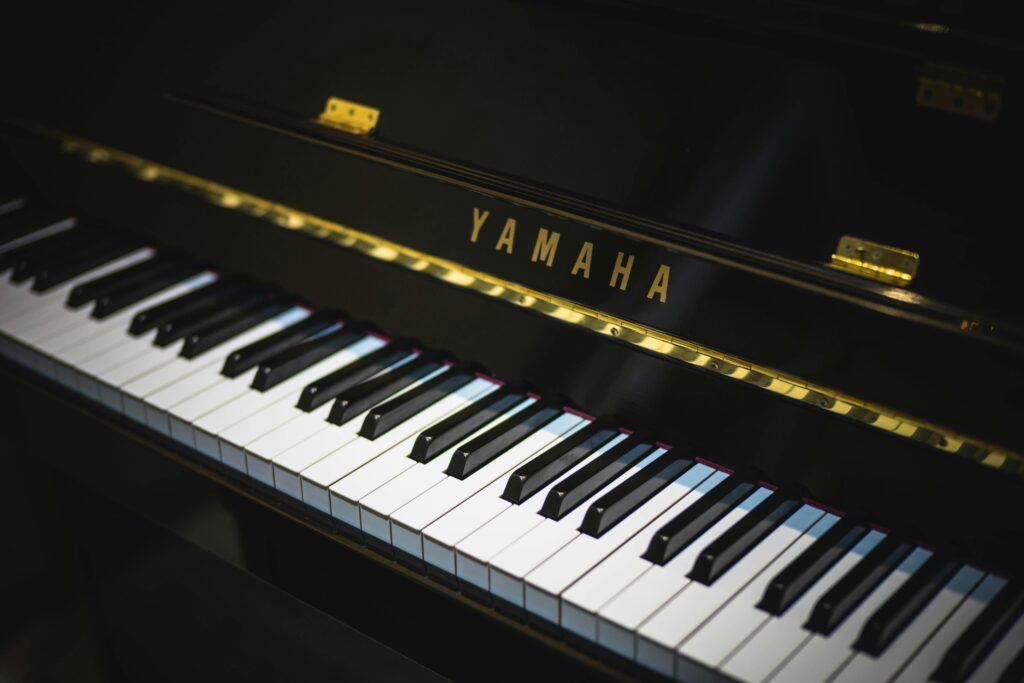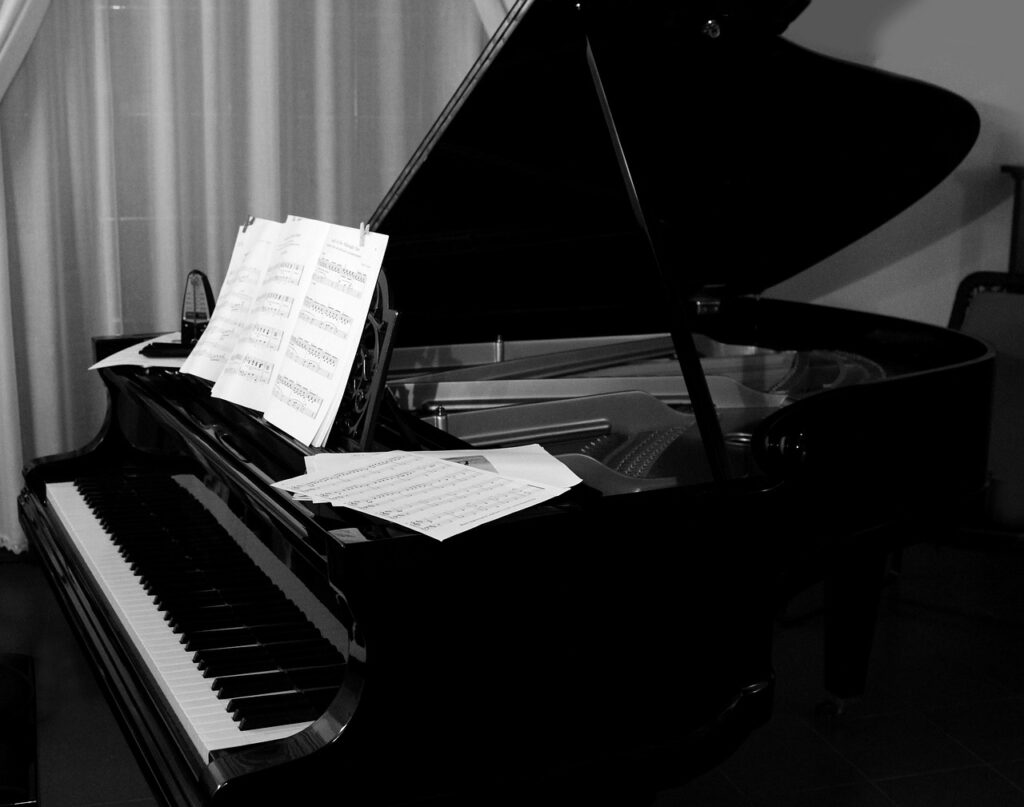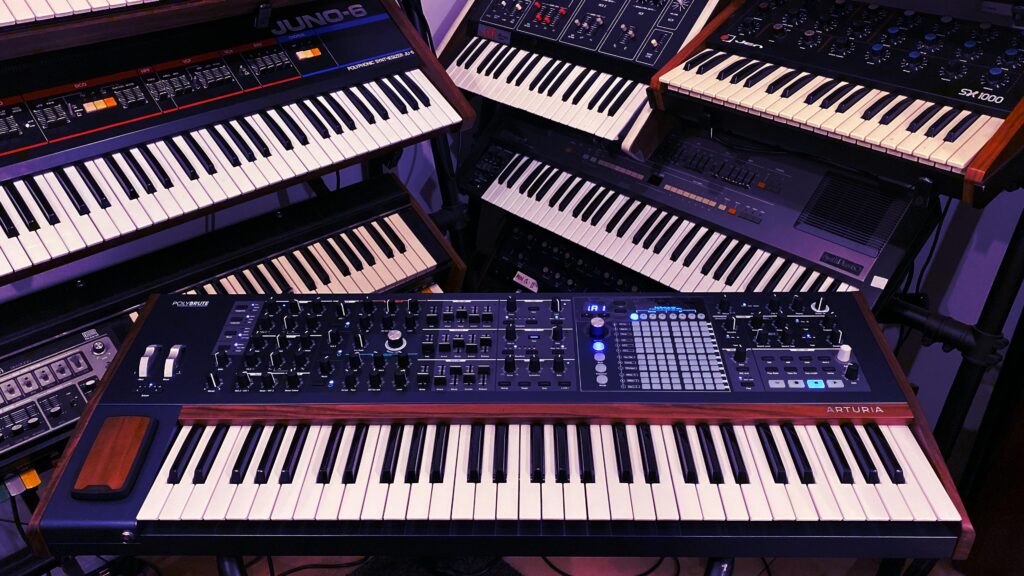Choosing your first digital piano or keyboard is an exciting step in your musical journey. Whether you’re just beginning to explore the world of music or seeking a versatile alternative to an acoustic piano, selecting the right digital piano is an important decision.
In this article, we’ll guide you through the process of choosing your first digital piano, demystifying technical terms, exploring different types of digital pianos and keyboards, and providing valuable insights into trusted brands and key features. If you’re ready to dive into the world of digital music, you’re in the right place. Let’s explore the fascinating universe of digital pianos and keyboards and help you make an informed decision that suits your musical needs and preferences.
Difference Between a Digital Piano and an Electronic Keyboard
In the world of digital music, the terms “digital piano” and “electronic keyboard” are often used interchangeably, leading to confusion. However, while they share similarities, these two instruments have distinct differences in terms of sound, functionality, and purpose. In this section, we’ll explain what a digital piano is and what an electronic keyboard is, while highlighting their key differences. Understanding these distinctions will help you make a more informed choice when selecting the instrument that best fits your musical needs.
What is a Digital Piano?
A digital piano, also known as an electronic piano, is a keyboard instrument designed to replicate the traditional acoustic piano as faithfully as possible in both sound and feel.
Digital pianos feature weighted keys and are usually full-sized with 88 keys. They are a more affordable, low-maintenance, and portable alternative to acoustic pianos.
They are ideal for beginners who want to learn to play a classical piano but prefer not to invest in the high cost of an acoustic instrument. Additionally, their compact size makes them easier to place in homes.
Types of digital pianos include grand digital pianos, upright digital pianos, and stage pianos.
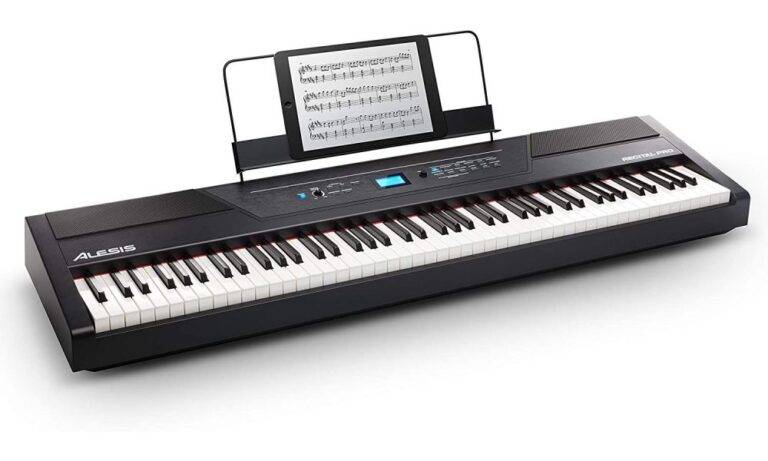
What is an Electronic Keyboard?
Unlike digital pianos, electronic keyboards are not designed to replicate an acoustic piano but to offer a broader range of sounds and functionalities.
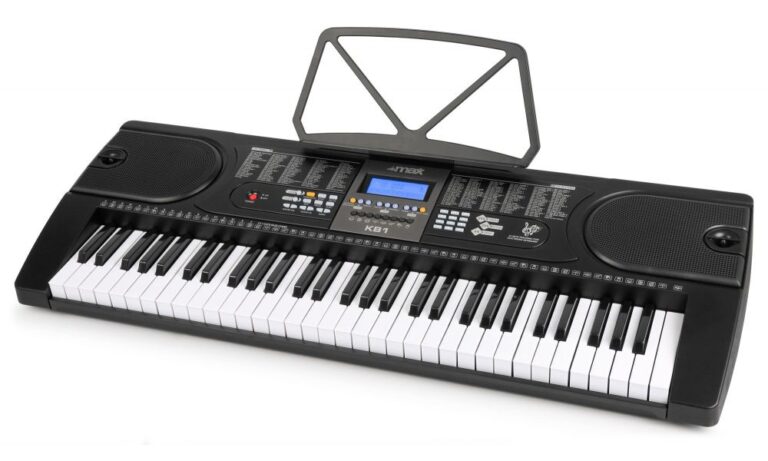
Keyboards are much lighter and easier to transport. They usually lack weighted keys, though higher-quality models may have sensitive keys. They also vary greatly in size, from small 32-key models to full-sized 88-key versions.
These instruments can recreate the timbre of various other instruments, such as violins, guitars, organs, accordions, basses, and xylophones, among others. They often include features like metronomes, note transposition, sound recording, rhythms, and pre-recorded songs.
Types of electronic keyboards include synthesizers, arranger keyboards, and stage keyboards.
Types of Digital Pianos and Keyboards
Choosing the right digital piano or keyboard is essential to your musical experience. The market offers various types of digital pianos and keyboards, each designed to meet specific needs and performance styles. Below, we’ll explore the most common types:
- Grand Digital Piano: These elegant instruments closely replicate the appearance and sound of an acoustic grand piano. They feature weighted hammer-action keyboards and advanced sampling technology for an authentic playing experience. Ideal for classical pianists and those seeking a rich, expressive piano sound.
- Upright Digital Piano: Compact and versatile, upright digital pianos are an excellent choice for those with limited space. They provide a sound quality similar to a grand piano and often include a variety of voices and additional features. Perfect for students and amateur musicians.
- Arranger Piano or Keyboard: These instruments are perfect for creating musical accompaniments and arrangements. They come with a wide range of preprogrammed styles and rhythms, allowing musicians to play along with a virtual band. Great for composers and session musicians.
- Stage Piano or Keyboard: Designed for live performances, stage pianos are portable, lightweight, and offer a variety of high-quality sounds. Musicians value their versatility and ease of transport.
- Synthesizer: Synthesizers are versatile instruments that allow you to create and modify a wide range of sounds. They are essential for music production and creating electronic music. Synthesizers range from simple models to advanced modular synthesizers.
- MIDI Controller: These keyboards do not produce sound on their own but are essential for controlling other MIDI devices, such as synthesizers and music production software. They offer a wide range of control functions and are ideal for studio musicians and producers.
The Best Digital Piano and Keyboard Brands
When choosing a digital piano or keyboard, the brand can play a crucial role in the quality and durability of the instrument. Here are some of the top brands in the world of digital pianos and keyboards:
- Yamaha: Known for its wide range of high-quality instruments, from beginner-friendly keyboards to premium digital pianos. Yamaha stands out for its sound quality and durability.
- Roland: Renowned for technological innovation in electronic music. Roland offers digital pianos and keyboards with exceptional sound quality and realistic key action, making it a favorite among professionals.
- Kawai: This Japanese brand is praised for its high-quality acoustic and digital pianos, often noted for their top-tier keyboard action and sound.
- Casio: A versatile brand offering affordable options for beginners and high-end digital pianos. Casio is recognized for durability and educational features.
- Korg: Known for its synthesizers and high-quality keyboards, Korg products are valued for their innovation and versatility.
- Nord: Specializing in high-end stage pianos and synthesizers, Nord is celebrated for its exceptional sound quality and stage-ready durability.
Types of Keys
The type of keys on a digital piano or keyboard greatly impacts the playing experience. The feel and responsiveness of the keys determine how close the instrument feels to a traditional acoustic piano and whether it meets your needs as a musician. Below, we’ll explore the most common types of keys:
Sensitive Keys
Sensitive keys respond to the force with which you press them, producing different dynamics (volume) based on how hard or soft you play. This feature is essential for expressive playing and is commonly found in both digital pianos and keyboards.
Weighted Keys
Weighted keys simulate the feel of an acoustic piano by replicating the resistance and weight of real piano keys. This is achieved using mechanisms that mimic the action of hammers inside a traditional piano. Weighted keys are ideal for classical pianists and those looking for an authentic playing experience.
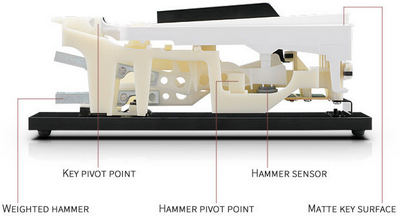
Semi-Weighted Keys
Semi-weighted keys provide some resistance but do not feel as heavy as fully weighted keys. These are a middle ground between non-weighted and fully weighted keys and are commonly found on keyboards designed for general use.
Non-Weighted Keys (or Synth-Style Keys)
Non-weighted keys are lighter and do not replicate the feel of an acoustic piano. They are ideal for synthesizers, portable keyboards, and instruments designed for electronic music.
Organ Keys
Organ keys are typically non-weighted but are often lighter than standard non-weighted keys. They are specifically designed for playing organ music and allow for fast, smooth transitions.
Illuminated Keys
Illuminated keys light up to indicate which notes should be played. This feature is especially helpful for beginners learning to play new songs.
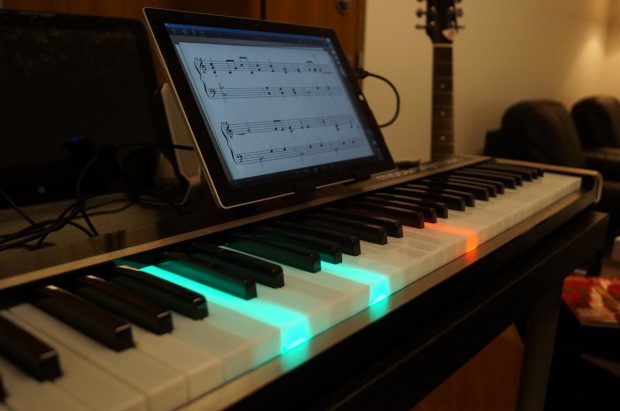
How Long Does a Digital Piano Last?
Investing in a digital piano is a significant decision, and one common question is: how long will it last? The longevity of a digital piano depends on several factors, including build quality, usage, and maintenance. Here, we’ll explore the estimated lifespan of a digital piano and tips to extend its life.
Estimated Lifespan
On average, a high-quality digital piano can last between 10 and 20 years, while entry-level models may last around 5 to 10 years.
Factors That Affect Longevity
- Build Quality: Premium brands like Yamaha and Roland often produce instruments that last longer due to superior materials and craftsmanship.
- Usage: Frequent or rough use can lead to faster wear and tear, especially for portable keyboards.
- Environment: Exposure to extreme temperatures, humidity, or dust can negatively impact the instrument’s internal components.
- Maintenance: Regular cleaning, updates to software (if applicable), and proper storage can extend the life of a digital piano.
Tips to Extend Your Digital Piano’s Lifespan
- Keep the instrument in a stable, climate-controlled environment.
- Clean the keys and exterior with a soft cloth to avoid dust buildup.
- Avoid placing heavy objects on the keyboard.
- Use a surge protector to safeguard the instrument from power fluctuations.
Where to Buy a Digital Piano
Buying a digital piano is an exciting step in your musical journey, but finding the right place to purchase one can be challenging. With a wide range of options available—local stores, online retailers, and private sellers—it’s crucial to make informed decisions to get the instrument that best fits your needs and budget. Here’s a detailed guide to help you decide where to buy your digital piano.
Local Music Stores
Local music stores offer the advantage of physical proximity. You can visit the store, test different digital pianos, and receive personalized advice from music experts. Many local stores also provide repair and tuning services, which can be beneficial in the long run. However, prices at brick-and-mortar stores may be higher due to operational costs. Here are some key considerations when shopping at a local store:
Advantages:
- In-Person Testing: You can play and test various models before making a purchase.
- Professional Advice: Music experts can guide you in choosing the right digital piano.
- Maintenance Services: Many stores offer tuning and repair services.
Disadvantages:
- Higher Prices: Physical stores often have higher prices due to overhead costs.
- Limited Selection: Local stores might not offer the same variety as online retailers.
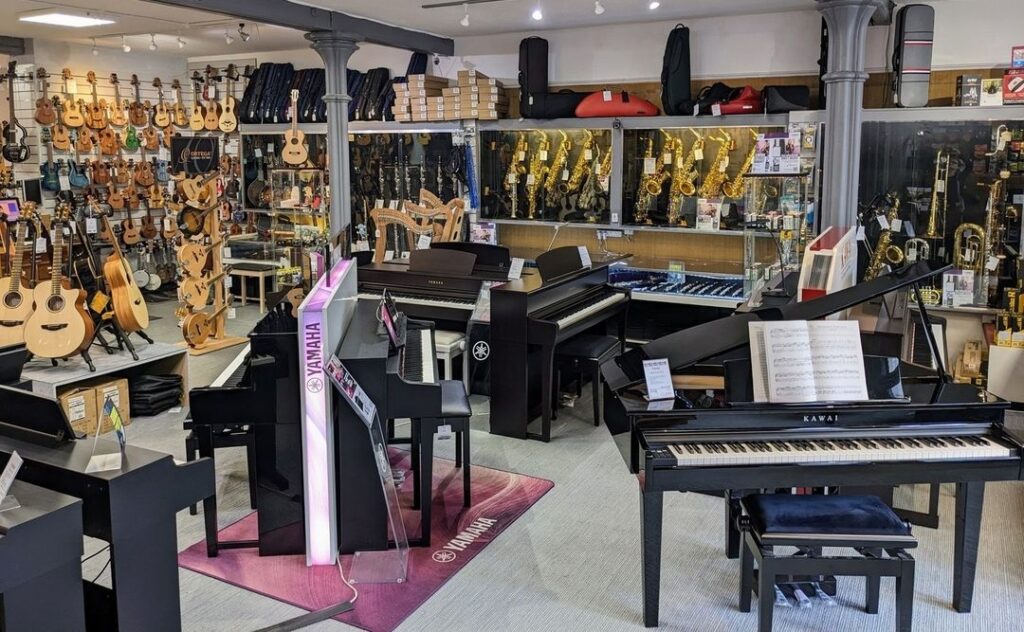
Specialized Online Stores
Online stores specializing in musical instruments provide a vast selection of models and brands. You can easily compare prices and features while reading reviews from other buyers. These stores often offer discounts and special promotions. Be sure to choose a reputable online store with good return and warranty policies. Popular options include Amazon, Thomann, and Gear4Music. Here are some key points to consider when buying online:
Advantages:
- Variety: Access to a wide range of models and brands.
- Easy Comparison: Conveniently compare prices and features.
- Online Discounts: Many online stores offer discounts and promotions.
Disadvantages:
- No In-Person Testing: You can’t try the piano before buying.
- Shipping and Returns: Understand the store’s shipping and return policies before making a purchase.
Buying from Private Sellers
Some people sell their digital pianos directly through online listings or social media. If you choose to buy from a private seller, inspect the piano’s condition, test it if possible, and ask for a service or maintenance record. Here are some considerations when purchasing from individuals:
Advantages:
- Potential Savings: You might find great deals when buying from private sellers.
- Direct Communication: Ask the seller specific questions about the piano’s condition and history.
Disadvantages:
- Risk of Purchase: There’s usually no warranty or return policy with private sales.
- Piano Condition: Ensure the piano is in good working condition.
Final Thoughts
Deciding where to buy a digital piano ultimately depends on your personal preferences, budget, and needs. Whichever option you choose, make sure to research and compare before making a final decision. Buying a digital piano is a significant investment in your musical passion, and finding the right instrument will make your musical experience even more rewarding.

